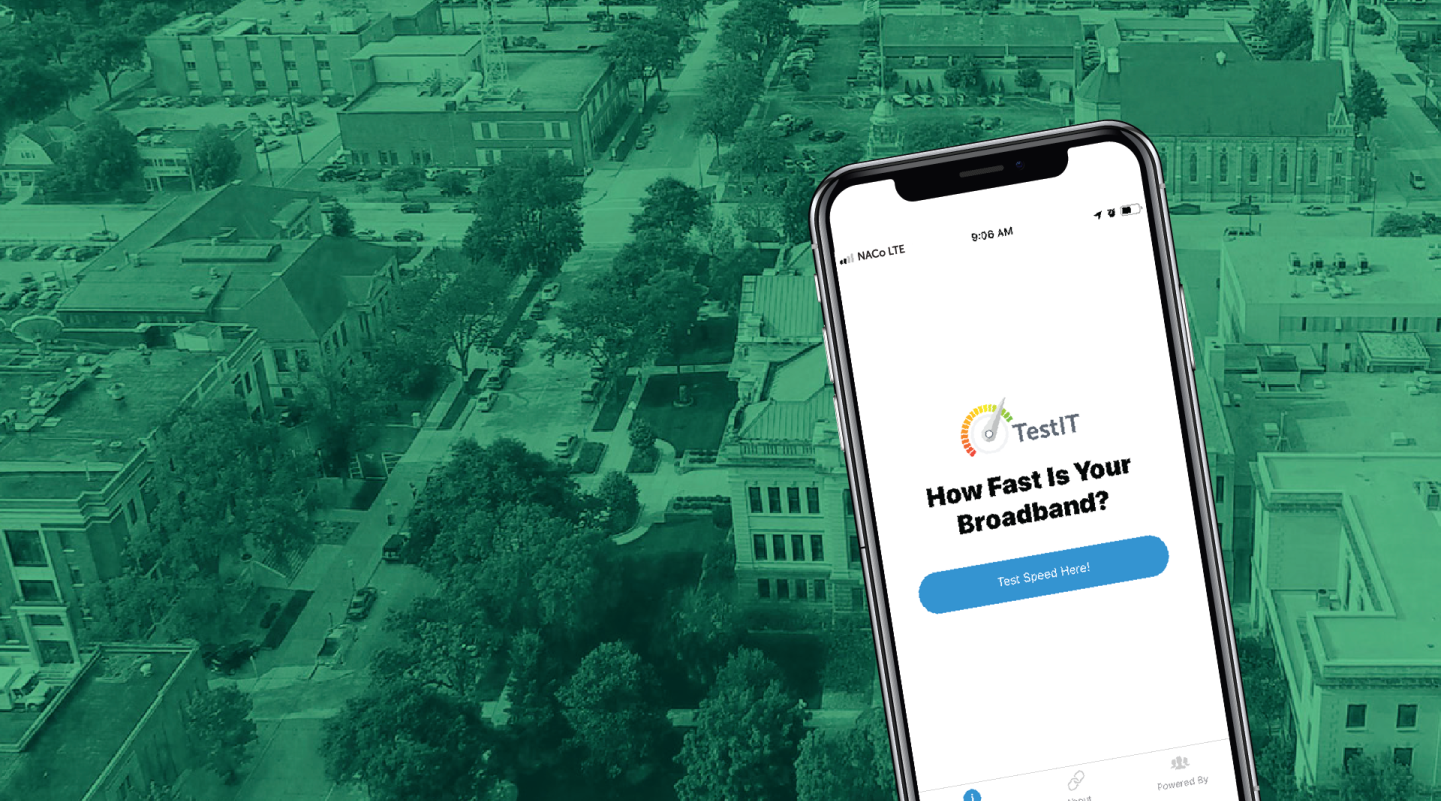Outreach Toolkit for Counties: The FCC’s Affordable Connectivity Program

Author

Seamus Dowdall
Upcoming Events
Related News
Advocacy Alert
In May of 2024, the Affordable Connectivity Program (ACP) exhausted all funding due to a lack of additional congressional appropriations. At its peak, the program enrolled almost 23 million households to receive a monthly benefit to better afford a high-speed internet subscription.
NACo is conducting advocacy to ensure Congress authorizes and appropriates new funding for the program. Get involved in the growing effort to refund the Affordable Connectivity Program. See below for letters from NACo to the White House and Congressional Leadership on a permanent reauthorization and funding of the ACP.
Advocacy Alert
In May of 2024, the Affordable Connectivity Program (ACP) exhausted all funding due to a lack of additional congressional appropriations. At its peak, the program enrolled almost 23 million households to receive a monthly benefit to better afford a high-speed internet subscription.
NACo is conducting advocacy to ensure Congress authorizes and appropriates new funding for the program. Get involved in the growing effort to refund the Affordable Connectivity Program. See below for letters from NACo to the White House and Congressional Leadership on a permanent reauthorization and funding of the ACP.

Tell Your County Story To Revive The Affordable Connectivity Program
Have your residents been adversely affected by the end of the Affordable Connectivity Program? Share your county's story with us here to help elevate the importance of this program to Congress.
How to Get Involved
How Counties Can Get Involved
The ACP provided a long-term investment in broadband affordability and ensures households can access high-speed internet services that are essential for participation in virtual education, telehealth, work and more. With the program's end, counties can fill a major need for continued access to affordable internet access for residents by leveraging partnerships with trusted social service organizations and raising awareness of alternative affordability programs or resources.
There are a variety of ways in which counties can continue to prioritize affordable broadband access, including:
Meet with internet service providers and assess available affordability programs for residents
Explore cooperative purchasing programs to acquire used connectivity devices to distribute to residents-in-need
Leverage the networks of schools, libraries and other anchor institutions to keep residents informed and to provide additional resources
Apply for federal funding to promote digital inclusion programs at the county level for residents in need
Host a press conference or community event to highlight the need to renew the Affordable Connectivity Program
Program Background and Overview
High-Speed Internet Affordability
Access to high-speed internet is required to succeed in the 21st-century economy, but many American households remain unconnected. According to a recent report by the Benton Institute, only about 25 percent of households whose incomes are $25,000 per year or less have both wireline and cellular data plan subscriptions, and for households whose annual incomes are between $25,000 and $50,000, only 52 percent have both wireline and cellular data plan subscriptions. By connecting these households to high-speed internet, we build stronger communities. Through the FCC's Affordable Connectivity Program, counties played a central role in providing all residents with an equal chance to connect to high-speed internet in their homes.
FCC’s Affordable Connectivity Program and Counties
On December 31 2021, the Federal Communications Commission (FCC) officially launched the Affordable Connectivity Program (ACP), a $14.2 billion program enacted under the Bipartisan Infrastructure Law (BIL) that replaces the Emergency Broadband Benefit (EBB) program authorized under the American Rescue Plan Act of 2021.
The ACP provided a discount of up to $30 per month toward internet service for eligible households and up to $75 per month for households on qualifying Tribal lands. Eligible households could also receive a one-time discount of up to $100 to purchase a laptop, desktop computer, or tablet from participating providers if they contribute between $10 and $50 toward the purchase price.
To participate in the ACP, a member of a household had to meet at least one of the criteria below:
- Has an income that is at or below 200 percent of the Federal Poverty Guidelines
- Participates in certain assistance programs, such as Supplemental Nutrition Assistance Program, Medicaid, Federal Public Housing Assistance, Supplemental Security Income, Special Supplemental Nutrition Program for Women, Infants and Children, or Lifeline
- Participates in one of several Tribal specific programs, such as Bureau of Indian Affairs General Assistance, Tribal Head Start (only households meeting the relevant income qualifying standard), Tribal Temporary Assistance for Needy Families program, or Food Distribution Program on Native American Reservations
- Is approved to receive benefits under the free and reduced-price school lunch program or the school breakfast program, including through the U.S. Department of Agriculture (USDA) Community Eligibility Provision
- Received a Federal Pell Grant during the current award year
- Meets the eligibility criteria for a participating broadband provider’s existing low-income program
The program has ended as of June 1, 2024, and the FCC has provided the below ACP wind-down resources to assist organizations with helping ensure residents have clear communication regarding the end of the program and next steps.
Resources can be found below:
- FCC Fact Sheet: The ACP Has Ended For Now
- FCC Resource: Frequently Asked Questions and Answers
- FCC Resource: Lifeline & ACP FAQs
Chatham County, N.C.

Chatham County published a press release on how the ACP will reduce barriers to accessing high-speed and reliable internet access.
Erie County, N.Y.

Erie County recently held a press conference on the ACP and how eligible households can benefit from the program.
Fairfax County, Va.

Fairfax County published a webpage summarizing the ACP and sharing an FCC produced video about the program. The site also outlines how the ACP protects consumers and provides a link to a list of participating internet service providers.
Fulton County, Ga.

Fulton County has partnered with several internet service providers, non-profits and faith organizations to launch the FulCo Digital Ambassador program, which will seek to enroll at least 20,000 qualifying households in the ACP. The county also held an in-person event to help residents enroll in the ACP.
Bucks County, Pa.

The Bucks County, Pa. informational site for ACP, how to enroll and eligibility requirements.
Montgomery County, Md.

Montgomery County’s Office of Broadband Programs (OBP) published a page on the county’s website outlining the program, eligibility requirements and instructions on how to apply. The page also provides an in-depth list of broadband providers that offer services in the county and a list of low-cost broadband plans available for low-income families.
Montgomery County OBP is also working with ConnectedDMV to provide “Train the Trainer” trainings for staff, volunteers and case workers that want to better understand how to enroll residents in ACP.
Volusia County, Fla.

Volusia County Public Library is working to help build awareness about ACP by hosting presentations by FCC consumer experts who will share information about the program. In total, the County intends to host 7 sessions at various branches across the county.
King County, Wash.

In conjunction with its Connecting Hennepin program, Hennepin County published information on its website about the Affordable Connectivity Program, eligibility requirements, instructions on how to apply and a list of service plans (and service areas) in the county.
Additionally, the county created co-branded promotional flyers with the FCC and the City of Minneapolis to promote the program. The flyers are available in four languages: English, Hmong, Somali and Spanish. The flyers can be found here.
St. Mary’s County, Md.

St. Mary’s County issued a press release to inform the public about the Affordable Connectivity Program and provide a brief overview on program benefits and eligibility requirements. The press release also provided residents with a link to further information on the county’s broadband-related initiatives.
Cuyahoga County, Ohio

Cuyahoga County is proposing to enter a 3-year contract with a local nonprofit (PCs for People) to provide 5G fixed wireless internet capable of providing 100 mbps symmetrical internet access to nearly 25,000 residents in many of the County’s least connected communities.
Although the service would cost $15 per month for a resident, the county has noted that residents that qualify for ACP can have the cost fully covered through its $30 per month subsidy. The county has also noted that PCs for People can provide residents with a free or low-cost computer and ACP qualifying families can receive a $100 subsidy toward a computer.
Bledsoe, Marion, Rhea, Sequatchie & Van Buren Counties, Tenn.





Bledsoe County School District has created a step-by-step guide on how families of students within its county schools qualify and can apply for ACP funding. Since every student at these schools are eligible to receive benefits under the free and reduced-price school lunch or the school breakfast program, every household with a student attending these schools qualifies through their child/dependent (as listed on the FCC ACP guidance).
Additional Resources
- FCC Outreach Toolkit*
- List of Participating Providers
- White House Fact Sheet
- NACo Blog: Launch of the Affordable Connectivity Program
- White House ACP Enrollment Site: GetInternet.gov
Counties are also able to request FCC speakers to discuss the ACP further. You can do so by emailing ACPspeakers@fcc.gov.
* Consumer handouts and the fact sheet are also available in Arabic, Chinese-Traditional, Chinese-Simplified, French, Haitian-Creole, Korean, Portuguese, Russian, Spanish, Tagalog, and Vietnamese.

NACo's TestIT App
NACo has partnered with the Local Initiatives Support Corporation (LISC), the Rural Community Assistance Partnership (RCAP), the National Association of Development Organizations (NADO) and Farm Credit to develop a mobile app designed to identify areas with low or no connectivity to help ensure adequate funding for broadband infrastructure is provided across the country.






